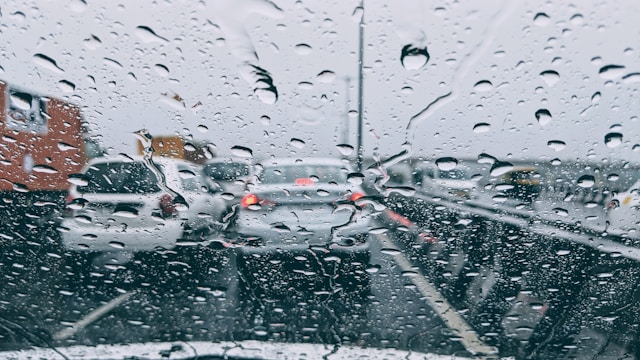5 Vital Suggestions for Driving Safely and Legally in Wet Weather

Dubai is known for its hot, dry climate. However, during the winter months it experiences occasional rainstorms that can make driving conditions hazardous. The roads become slippery, visibility is reduced, and flooding is common. Drivers in Dubai are not accustomed to navigating wet weather, which leads to an increase in accidents and traffic violations when it rains.
Government officials advise residents to avoid driving when storms hit. However, for those who must drive, extra caution is necessary. Breaking traffic laws not only endangers yourself and others, but can also lead to fines, black points against your license, and even confiscation of your vehicle. By following key safety suggestions and traffic regulations, drivers can safely reach their destination while avoiding penalties.
Increase safety distance between vehicles
Slippery road conditions reduce braking ability, so it’s vital to leave ample room between your car and the one ahead. The general recommendation is to allow a 2-second following distance. However, in the rain this should be increased to at least 4-5 seconds.
Scan farther down the road so you can ease off the gas early and brake gradually. Avoid sudden speed changes. Signal early before turning so drivers behind you aren’t caught off guard. Allow extra distance for large vehicles that require more stopping room.
Adhere to traffic signs and signals
Traffic lights, stop signs, and speed limits exist for safety, but are even more crucial when driving in wet weather. Roads may have sections prone to flooding or hidden hazards you can’t see. Obey all posted signs and warnings.
Yellow lights signify the need to slow down and prepare to stop. Do not speed up to try to “beat” a changing light, as this risks skidding through the intersection if unable to stop in time. Stop lines are placed strategically before intersections to allow a buffer for braking. Do not inch forward over the line, as visibility is already reduced.
Drive cautiously and carefully to prevent accidents
Driving in heavy rain requires your full attention and caution. Avoid distractions in the car, keep both hands on the wheel, and focus your eyes and mind completely on the road.
Scan for potential slick spots like paint lines or metal surfaces. Slow down below posted speed limits if conditions call for it. Turn headlights on low beam to see and be seen without glare or reflection.
If your car begins to hydroplane, do not brake or turn suddenly. Ease your foot off the gas until the tires regain traction. If safely possible, pull off the road and wait for the storm to pass.
Regularly check brakes and tires for optimal performance
Well-maintained vehicles handle better on wet roads. Inspect brake pads and tires routinely, and replace them if worn. Good tread depth (at least 1/8 inch) pumps water from under tires to prevent hydroplaning.
Test brakes gently after driving through deep water. Apply them lightly several times to heat them up and dry them if needed. Check your owner’s manual on how to safely dry brakes.
Accumulation of black points for breaking traffic laws
In Dubai, drivers who break traffic rules receive black points on their license through the traffic monitoring system. Minor violations may add just 2-4 points, while more serious offenses can add up to 24 points.
If a driver accumulates 24 black points within a year, Dubai Police will confiscate their license for 6 months. After serving the suspension, 12 points remain on the license to serve as a warning.
Risk of license confiscation with 24 black points
Because black points remain valid for a full year, it’s possible for drivers to accumulate over 24 points by repeatedly violating traffic laws. Reaching 24 points triggers the 6-month confiscation penalty.
With the elevated hazards of rain, it’s vital that drivers concentrate, follow safety procedures, and obey all traffic signs and speeds. A momentary slip in judgement can quickly lead to license suspension if black points have already mounted.
Overview of common traffic violations and potential penalties
Some of the most common offenses during rainy weather include using hazard lights incorrectly, handling mobile phones, sudden lane changes, and dangerous maneuvers like ignoring signals or swerving across the road.
Fines range from AED 400 up to AED 2000 depending on the severity of the violation. Points on the license can range from 2 all the way to 23. In extreme cases with repeat violations, vehicles may be confiscated for 60 days on top of fines and black points.
Common tendency of drivers to misuse hazard lights, especially in rainy conditions
Many Dubai drivers switch on hazard lights during heavy rain, perhaps trying to warn other cars of danger ahead. However, this usually does more harm than good.
Hazard lights turn on all turn signals at once, so other drivers can’t decipher where the car intends to go next. This leads to confusion and reduces visibility. It can actually hide turn signals when they are properly needed.
Impact of frequent use on road safety and visibility
By law in Dubai, hazard lights are only permitted while parked or stopped, such as during emergency vehicle passage or dangerous road conditions. They should not be used while driving.
Incorrect use warrants a AED 500 fine and 4 black points. Beyond legal penalties, the flashing lights impair other drivers’ vision and hide true turn signals, creating a safety risk.
Conclusion
Driving in rainy conditions demands heightened attention, reduced speeds, and full adherence to traffic laws. Drivers must prioritize safety by increasing distance between cars, obeying signs and signals, regularly checking their vehicles, and avoiding distractions inside the car. Violating rules risks accidents plus accumulation of black points and hefty fines. Dubai Police aim to keep roads safe, not to penalize drivers. By following their guidance and driving cautiously in rain, motorists can protect themselves, their passengers, and fellow commuters.c



